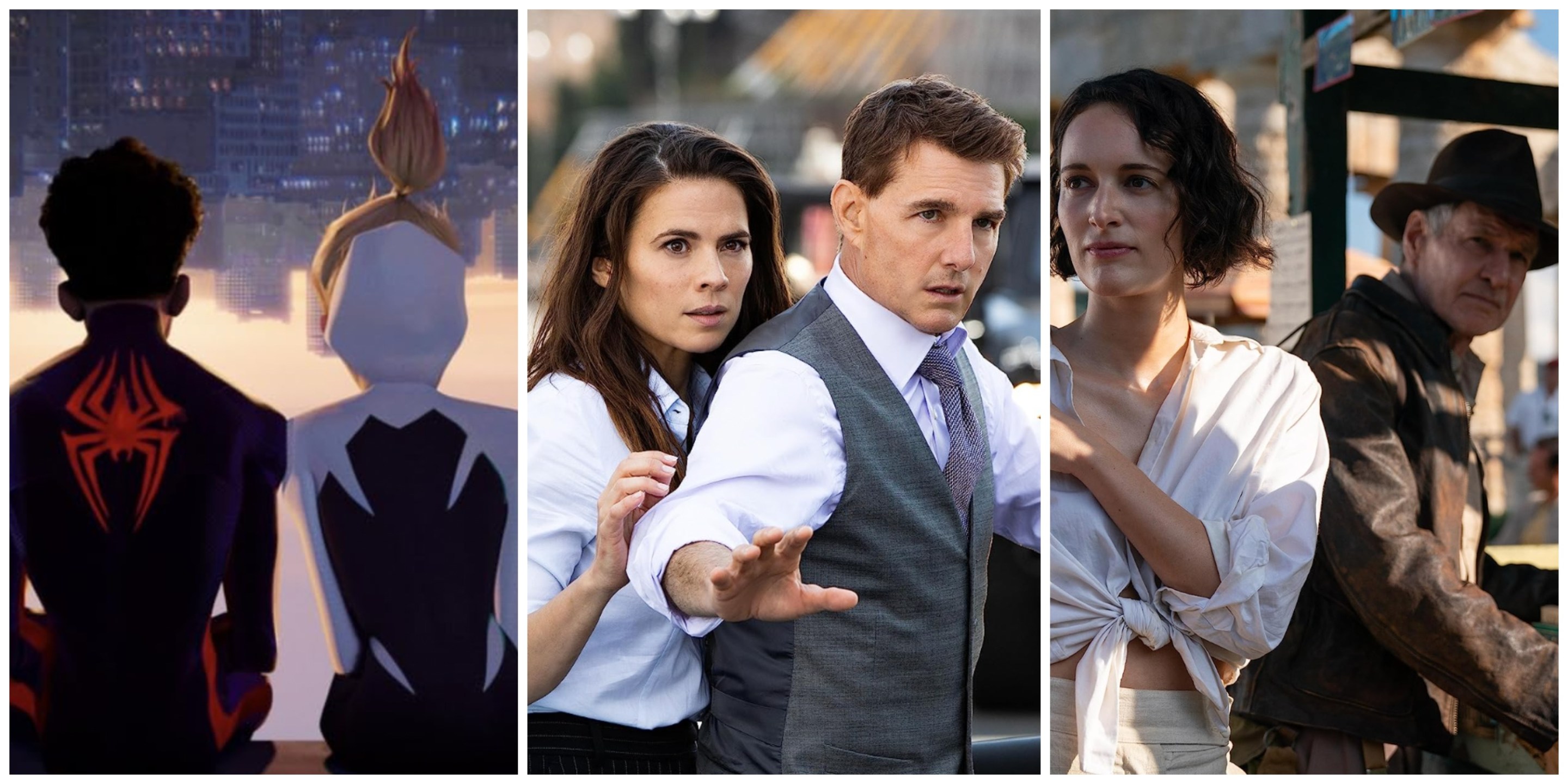I’m sure we can all agree that the biggest problem with Top Gun: Maverick (aside from all of the dialogue and most of the fascism) was the dearth of Tom Cruise running. Such a huge waste of our greatest cinematic sprinter, who’s never more himself than when channeling all his pointless intensity and excess determination and flagrant un-CGI-ness into a basic human activity that paradoxically makes him seem less like a fellow member of our species than ever. As his newest Mission Impossible co-star Hayley Atwell said recently in Interview Magazine, Cruise not only runs with flawless technique (a WSJ consult with experts backs her up there) but with a duality of purpose “as if he’s running towards the thing he wants to save and also running away from a bear.”
Running has always been how Cruise asserts superspy Ethan Hunt’s inalienable personhood (not to mention the actor’s own) in the Mission Impossible movies. Strip away all the fancy spyware and uncanny masks and whatever vehicle is mysteriously waiting nearby for him to commandeer and Hunt stands before you, a man, his body his true weapon of offense and defense. He’s the fictional epitome of Cruise’s analog crusade, that reliance on practical effects bordering on mania (and “bordering” puts it kindly), and though it’s taken him seven movies to get to this point, Hunt/Cruise encounters his ultimate nemesis in Mission Impossible — Dead Reckoning Part One: artificial intelligence.
A particularly timely foe, for sure, in Hollywood as elsewhere. And from Hunt's algorithms to Indiana Jones's Nazis, from the Guardians of the Galaxy's intellectual property hoarders to Across the Spider-Verse's self-righteous protectors of the comic book canon, the adversaries in this summer's blockbusters and would-be blockbusters refracted real-world concerns in peculiar ways. The onscreen heroes fought symbolic battles, not to protect you and me from danger, but to neutralize those factors that would interfere with a studio's inalienable right to keep filling movie theaters with expensive franchised entertainment.
The AI the Hunt's IMF must confront is called the Entity (maybe if they’d named it something less ominous it would have been friendlier) and it’s capable of nasty shit like tricking a submarine into torpedoing itself, just as a warmup. Oh, and it also threatens “truth,” we’re told repeatedly. I guess when your villain is essentially invisible you’ve got to sprinkle the action with bold declarations like “whoever controls the Entity controls the truth” to remind us it exists. Even Vanessa Kirby’s wonderfully vampy arms dealer Alanna Mitsopolis gets solemn for a moment to tell us, “The world is changing. Truth is vanishing. War is coming,” as though Middle Earth was about to be overrun by orcs.
So how do you neutralize or control a sentient algorithm? Fortunately, there’s a key. (There’s always a key.) But the key is in two parts (isn’t it always?) and Hunt is dispatched to various cinematographically rewarding sites to retrieve both. Enter Atwell and her alluring nostrils. She's Grace, a pickpocket who gets tangled up in IMF affairs when she palms a half-key from Cruise. Together, Atwell and Cruise have terrific onscreen… well, I wouldn’t quite call it “chemistry,” but let’s say their onscreen rhythms are engagingly compatible. The film is so much about Grace’s development as an individual and as an action hero you might suspect that Atwell’s been anointed as Cruise’s eventual successor. Then again, that’s what they used to say about Jeremy Renner.
The Entity does have a human avatar. Its murderous herald, Gabriel (a charisma-neutral Esai Morales), turns out to have killed a woman that Ethan loved long ago. This relationship between the men inspires a bunch of portentous nonsense about how Hunt cannot escape his past, but really they’ve just retrofitted Hunt’s backstory to give him a reason to want to kill Gabriel, and they only made that choice so we get to see Cruise do that thing where he loses his cool and yelps angrily at someone. To his credit, Cruise seems aware that no one has expected him to convey a complex emotion since the 20th century, and without getting too bogged down in characterization he simply switches between his thoughtful face and his playful face and his mad face and his sad face, as needed.
How could such a tale possibly be told in less than two three-hour movies, you ask? Well, pretty easily, of course, especially since the stunts you bought your ticket to see could be attached to any old plot. Show-off that he is, Cruise spoiled his movie’s big motorcycle set piece months ago with a behind the scenes trailer. But the other action sequences refuse to disappoint you. If there’s a car chase, Hunt will surely be chased by multiple aggressors. If a train’s gonna plummet into a ravine, it’s gonna happen car by car by car. After its initial stylistically disjunct trilogy, the series found a consistent, replicable style with Mission Impossible – Ghost Protocol in 2011, which solidified when Cruise crony Christopher McQuarrie took over as writer/director with Mission: Impossible – Rogue Nation four years later, so you know what you’re getting here.
As always in the Mission Impossible movies, the global backdrop is one of realpolitik verging on nihilism—since no nation (most definitely including the United States) can be trusted with the power of the Entity, Hunt determines, the AI must be destroyed. By Hunt himself, of course, since no one else is willing to do what’s necessary. The only way for the U.S. to preserve its democratic institutions is to provide state-of-the-art equipment to an undercover unit that consistently goes rogue because its members can never trust their supervisors. Turns out there's no more graceful way to sidestep the culture wars than to embrace a kind of political paranoia that left and right alike can nod along with.
If it seems a little on the nose for Dead Reckoning to identify the greatest threat to Tom Cruise’s existence as a malevolent algorithm (why didn’t they just name it “Netflix”?) how about an Indiana Jones movie centered on time travel? From the start, Spielberg and Lucas wanted to turn back the clock to a simpler era when we all knew who the bad guys were: Nazis. Well, hey, good news, Greatest Generation nostalgics: The Nazis are back—in real life. And so the simpler time that Indiana Jones and the Dial of Destiny hopes to reach isn’t the '60s or the '40s, where the film takes place, but the ’80s, back when all this Nazi-punching business still seemed like good escapist summer fun.
And there is fun to be had along the way here. Harrison Ford doesn’t look like he’s waiting around to die, as he did so uncomfortably in The Force Awakens. And an aged Indy snoozing in front of the television in his boxers then grabbing a baseball bat to quiet his rowdy young neighbors is good if easy comedy. (Pedantic quibble: H.R. Pufnstuf, visible on the TV when Jones wakes up, didn’t premiere until about a month after the ticker tape parade for the crew of Apollo 11, through which we’ll soon watch Dr. Jones ride a police horse, Nazi thugs in pursuit, before galloping into the subway. A budget of $250+ mill and you couldn’t do a simple Wikipedia check?)
Phoebe Waller-Bridge, no one’s first guess for an action hero, is surprisingly spry and resourceful as morally challenged adventuress Helena Shaw, though she’s also the latest woman to draw fanboy ire by setting foot into no-girls-allowed territory. (Settle down, you YouTubers you, or we’ll bring back Kate Capshaw.) But poor Mads Mikkelsen—against whom Jones and Shaw race to collect Archimedes’ Dial, which reputedly allows its possessor to travel into the past—looks tremendously bored with being an American’s idea of a European baddie. And the way Karen Allen’s Marion is used as a notch in Indy’s character arc rather than a discrete individual, materializing solely for the purpose of providing closure, is gross.
Then there are the WWII scenes that begin the film, with a de-aged Ford Nazi-whomping and evading peril upon peril upon pitfall. In the moment, these scenes weren’t quite as ghoulish as I’d expected—the action sequences are fast-paced enough to keep your brain too distracted to pass judgment. But afterward, the gratuitous because-we-can implications, illustrating just how pathological movie escapism has become, can give you an aesthetic hangover. The machine that this series has become requires technology to perpetually recreate an imaginary past, simply to persist. And lacking the sense of grace or rhythm that can make an action movie more than just one damn thing after another, director James Mangold isn’t much more than the caretaker who stokes the engine.
What Spielberg and Lucas missed about the serials of their youth wasn’t just their moral certainty, but the brisk, inconsequential nature of their adventures, their disposable charm. Yet what their careers accomplished was to make thrilling, throwaway entertainment practically impossible. Action-adventure films have evolved into a species that’s synergistic, plodding, and—as Dial of Destiny’s dire box office shows—increasingly irrelevant. Forty years down the road from Raiders of the Lost Ark, here's a glimpse of an industry in ruins, ensconced in its bunker, denying its fate as an empire collapses around it.
I could have died happily without ever hearing a CGI cyber-otter utter the words, “My beloved raccoon, the story was yours all along,” in the voice of Linda Cardellini. But here I am, having emerged on the other side of Guardians of the Galaxy Vol. 3, and I can’t say I enjoyed it much more than the cast itself appeared to. Chris Pratt, Zoe Saldana (whose regular human face has hardly been allowed on screen since the Bush Administration), Karen Gillan, Dave Bautista, and Pom Klementieff (I think that’s all—or at least enough—of them) seem set on autoquip, looking ready to hang up their blasters even before the thing gets underway.
But underway the thing does eventually get, as Will Poulter’s golden-hued Adam Warlock (why are they always tossing another new guy at us?) blasts into the Guardians’ base planet and gravely wounds Rocket Raccoon (Bradley Cooper). While trying to save their genetically modified pal, the Guardians learn that his heart is password protected by the company that modified him, so they must infiltrate a Douglas Adams-y megacorp HQ and download a code or something. There, they learn that a being called the High Evolutionary (a particularly shouty Chukwudi Iwuji) wants to reclaim Rocket as his proprietary intellectual property because he needs the critter’s help to perfect his latest go at a utopia.
If repeatedly calling a raccoon a different kind of animal is your idea of hilarity (there are so many animals that are not raccoons!) well, sister, you’re gonna be laughing too hard to breathe here. There’s also a running gag where Cosmo the Spacedog is upset because she was called a “bad dog” and I swear to dog this lasts for the whole damn movie.
But like too many MCU flicks, Guardians 3 isn’t content to amuse us and dazzle us with compu-trickery and take our money. No, it wants us to feel. Flashbacks wade through some maudlin Secret of NIMH shit as we learn about Rocket’s origins. These cheap moments, along with other clumsily manipulative segments, are like electroshocks of sentiment, the emotional equivalent of jump scares. Oh, and maybe I was just inattentive, but in the final battle I lost all sense of place and couldn’t figure out where people were running to and from. With great effort, I almost reoriented myself. Then I remembered I didn’t care.
The upshot: A band of scrappy rejects goes up against a world creator who hoards intellectual property, believes creation can be perfected, and punishes his “mistakes” with genocide. Your brain doesn’t have to work too hard to see the High Evolutionary as a stand-in for Disney itself, with its preoccupation with refining the messiness of human invention through CGI and to wipe all flawed (or insufficiently profitable) content off the map (or at least streaming platforms). You could call that irony, I suppose. Or cynicism. Or a subtle criticism of the film’s corporate overlords. Or James Gunn cashing another paycheck.
Because I was already in middle school when Reagan first allowed toy commercials to be marketed as children’s entertainment, I’m about as nostalgic for Transformers as I am for Ed Meese. Well, Meese received the Presidential Medal of Freedom a few years back and the think tank that bears his name now vets the doctrinaire reactionary judges who receive lifetime appointments from Republican presidents. And Transformers? They aren’t going away any time soon either.
The latest installment in the franchise, Transformers: Rise of the Beasts, is a sequel to the quite watchable 2018 kids’ movie Bumblebee, whose charm I chalk up to Hailee Steinfeld’s ability to do no wrong. This movie takes place in 1994 because—well, near as I can tell, because the filmmakers like that era’s hip-hop. And I do too! But the near-continuous boom-bap soundtrack is just a little too insistently 1994. (And yet somehow somehow Biggie’s “Hypnotize” slipped into the mix?) Most of the first half hour of the movie focuses on the human characters, Noah (Anthony Ramosa), who’s struggling to pay for his little brother’s lupus treatment, and Elena (Dominique Fishback), a whiz at researching artifacts. To quote the kid sitting next to me: “Somebody transform already!”
Like the latest Mission Impossible, the plot of Rise of the Beasts turns on retrieving two halves of a key. Once reassembled, this Transwarp Key would allow the Autobots to return to their home world of Cybertron, but it may also allow the planet-consuming entity Unicron, aided by his minions the Terrorcons, to devour Earth, and I hope that sentence wasn’t as painful for you to read as it was for me to write. All of this information is conveyed with painful earnestness, and Optimus Prime in particular remains a colossal fucking buzzkill, issuing vows of loyalty and vengeance alike in the same stentorian, seat-rattling tone.
Whose idea of fun is this, I wondered, as giant toys tediously delivered exposition. Comic relief, such as it is, is provided by Pete Davidson as the hip Porsche Mirage, who he describes as "Jim Carrey's The Mask meets Bugs Bunny" and I describe as “a talking car with jokes even a 10-year-old boy would know are wack.” (Do you really want to pay to find out who’s right?) It’s nearly enough to make you miss the wit and concision of Guardians of the Galaxy Vol. 3.
Anyway, the Autobots team up with some other robots in Peru who look like animals for some reason, led by a gorilla named Optimus Primal (oh come on), and without giving too much away to anyone who wasn’t alive in 1994, the Earth is not devoured. Along the way, we get an answer to the pressing question “Can humans and Autobots work together for the greater good?” I dunno, man, I just came here to watch shit blow up in a cool way. Why does this truck keep lecturing me?
Can that sense of play I mentioned earlier, inaccessible to most contemporary blockbusters, live on in an animated action movie? There’s not much praise left to dollop on Spider-Man: Across the Spider-Verse that hasn’t already been dolloped, and it’s all earned. But rewatching the adventures of Miles Morales in the context of this summer’s drudging wallet-vacuums really highlights what producers Phil Lord and Christopher Miller do well. There’s a weightlessness to the movement here, a sense of possibility that’s been processed out of most “live action” movies. In Miles’s scenes battling The Spot, a being whose body is plastered with holes you can fall into, causing you to re-emerge someplace else, or his gravity-defying travels and hangs with Gwen Stacy, you feel that for once you’re seeing something new.
Most specifically, Across the Spider-Verse shows up the plodding, mega-grossing Spiderman: No Way Home, which unimaginatively gathered not just three Spiders-Men, but three Peter Parkers, and could think of no purpose for the get-together other than to battle all their old villains. Wouldn’t you prefer a multiverse (a word to dread in most instances, I know) where each individual universe we enter is rendered in a distinct style: the impressionistic pastel setting of Gwen’s world, the crackling 3D-without-the-glasses backdrop of.Miles’s Brooklyn, the broad strokes of the dazzling metropolis Mumbattan. Across the Spider-Verse is the first superhero movie in years that made me wish I knew more about comics—not about the minutiae of lore the online stans obsess over, but about the art itself.
Partly, what’s effective about Across the Spider-Verse is just solid craft. The quippy script is fine, but it’s nimble delivery and excellent voice work, especially from Shameik Moore as Miles and my girl Hailee as Gwen, that reminds me how the flat rhythms of MCU doom its jokes as much as the screenwriting. The story of a confused kid who is alienated by his special abilities, rejected by those who share them, and ordered to fall in line with what authorities say is his destiny manages to be emotionally resonant too, without constantly tapping you on the shoulder and asking “Are you sad yet? How about now?”
Across the Spider-Verse offers dopes like me hope that popular entertainment can still be artful, that pop or pulp or genre or trash or whatever you want to call unpretentious mass culture still has room for the sense of stylistic play that makes it preferable to so many “serious” pictures. And it's willing to debate the strictures of canon. When Spider-Man of the future Miguel O'Hara (Oscar Isaac) condemns Miles for stepping outside the ur-Spider-Man narrative, he's an avatar for every nerd who gripes "you can't do that" about any tiny violation of comics orthodoxy. Miles's determination to follow his own path lands him in a dark place, and Miguel's warning about unintended consequences are valid. Across the Spider-Verse is willing to dramatize the dilemma that canon-bashers and canon police alike should ponder: How much consistency is required for a genre to remain stable?
It’s disheartening if hardly shocking to hear what a prison camp the Across the Spider-Verse turned out to be. According to a recent Vulture story, over a hundred animators quit before the movie was finished, and frazzled participants in the project said that due to Lord’s micromanagement ”they were pushed to work more than 11 hours a day, seven days a week, for more than a year to make up for time lost and were forced back to the drawing board as many as five times to revise work during the final rendering stage.” This sounds like the worst of two creative labor models: Working under the sweatshop conditions of proletarianized art while also being subject to the mercurial whims of a creative “genius.” “They’ve announced that Beyond the Spider-Verse will be released in March of next year,” one participant interviewed for the story said of the film’s forthcoming second half. “There’s no way that movie’s coming out then.”
So maybe I’m just pining for a historical moment when there was still enough give within capitalism to make worthwhile mass art possible, just as Spielberg and Lucas looked backward for an antidote for the exquisite sourness of the ’70s. (Or I’m in denial of the labor conditions needed to produce yesterday’s faves.) Because even at their best, the Mission Impossible movies have an air of manic desperation, a compulsion to entertain that betrays how clearly we have reached the end of an era. Each stunt screams: Please let me keep doing this. Maybe the Entity can’t be harnessed for good after all. If only we could find a key to switch it off.
All of these movies are currently in all the big movie theaters and in some of the smaller ones too.
Mission Impossible — Dead Reckoning Part One: B+
Indiana Jones and the Dial of Destiny: C+
Guardians of the Galaxy Vol. 3: C
Transformers: Rise of the Beasts: C-
Spider-Man: Across the Spider-Verse: A






